#ancient greek religion
Text
(Ranting about a comment I saw on TikTok.)
I genuinely need people to stop blaming ancient Greek religion/the gods for ancient Greek societal conventions like infanticide, slavery, and misogyny.
Exposed infants were protected by Kourotrophos gods!
Versions of the gods exist who were liberators of enslaved persons!
Women undeniably found the most freedom in the religious sphere!
For all of ancient Greece's sociocultural conservatism, the gods virtually demanded that worshippers subvert customs. In the words of my professor, "The Greek gods are a lot more progressive than you'd expect from the conservative ancient Greeks."
593 notes
·
View notes
Text

Polychrome terracotta sculpture of the god Dionysos, holding an egg and a rooster. The unusual attributes may hint at a connection to Orphism, which held that the first deity, Phanes or Protogonos ("First-Born"), was hatched from a cosmic egg. Adherents of Orphism saw humankind as the descendants of Dionysos (under the name "Zagreus"), created when the Titans devoured the young Zagreus and were then struck by Zeus' thunderbolt. Artist unknown; created in Tanagra, Boeotia (an important center of terracotta production) ca. 350 BCE. Now in the British Museum.
#classics#tagamemnon#Ancient Greece#Greek religion#Ancient Greek religion#Hellenic polytheism#Dionysus#Dionysos#Orphism#art#art history#ancient art#Greek art#Ancient Greek art#Classical Greece#Classical Greek art#Boeotia#Boeotian art#sculpture#terracotta#British Museum
516 notes
·
View notes
Text
Spiritual Pollution in Hellenic Polytheism
In Helpol, we have three concepts known as lyma, miasma, and agos.
To some, humans are seen as naturally pure beings, but because we are living mortal creatures, spiritual dirt can cling to us and make us impure.
Here, I will discuss these three types of pollution
(Disclaimer: Some of this information comes from my own personal interpretations, and therefore may not apply to the beliefs of everyone)
Lyma
Lyma means "something to be washed away". Itis generally just physical dirt. It isn't much of a big deal when it comes to spiritual matters. However, it is still best to be free of it when approaching the gods.
Miasma
This is where things get complicated.
Miasma is essentially general spiritual pollution. Miasma is something that is completely unavoidable and should not be shamed (well, depending on the cause). Miasma is mainly caused by things related to life and death. This includes sex, childbirth, visiting a cemetery, blood, sexual fluids, etc.
However, miasma has different degrees of severity. More severe miasma comes from acts such as rape, hubris, murder, etc.
Miasma also spreads from people to people. If you walk past someone on the street who just came back from a funeral, their miasma will cling to you as well. This also highlights how unavoidable miasma is. But usually, this kind of indirect miasma is not as bad.
We are not allowed to approach the gods in a state of miasma. Luckily, miasma is not difficult to get rid off (excluding the more severe cases listed above).
All you need to do is wash your hands.
If you get a cut on your leg, the blood is miasmic and therefore you can't approach the gods. But all you need to do is wait for the bleeding to stop, wash away the blood, wash your hands, and then you're good to go.
There is a debate I once had on whether miasma prevents us from praying, giving offerings, and participating in festivals. To me, the answer is yes, but not with prayers. Let me explain why.
In a very simplified description of a certain myth, Orestes killed his mother. This caused him to enter a state of severe miasma and a state of agos (which I will explain later). Long story short, he prayed and asked Apollon to help purify him, in return for a grand offering later on. Apollon heard the prayer and came to help purify Orestes.
In this example, we see that Orestes was still able to pray to Apollon in the worst state of miasma, but promised to give offerings later on.
This implies that prayer is not an issue with miasma.
Here is another example: You don't need to wash your hands when talking to someone, but you should wash your hands if you want to give that person food.
In a similar way, in my opinion, you don't need to wash your hands for a casual prayer, but you should wash them before giving an offering. Although, I also prefer not to pray when I know I am in a miasmic state.
However, this is my own interpretation and others may have different views.
There are other ways to cleanse miasma such as khernips, incense, and scapegoats.
Ocean water is also said to cleanse miasma extremely well.
Agos
Agos is a cursed state and is the most extreme form of spiritual pollution. However, agos is not easy to get.
If you commit a horrible act such as murder, you will be in a state of extreme miasma. However, when the gods notice your crime and get enraged (keep in mind that it is usually not that easy to anger the gods), the miasma evolves into agos.
Miasma is a naturally occurring thing, but agos only comes from the wrath of the gods.
Agos is difficult to remove and is a pretty big deal.
Luckily, you don't need to worry about agos unless you're a horrible person who commits heinous acts.
Aaaand that is my interpretation of spiritual pollution in Helpol. I hope this post can be helpful to you!
Blessed be!
#hellenic polytheism#hellenic polytheist#hellenic paganism#hellenic pagan#theoi#helpol#paganism#pagan#polytheism#polytheist#helpolblr#hellenism#hellenismos#hellenist#ancient greek religion#lyma#miasma#agos
387 notes
·
View notes
Photo
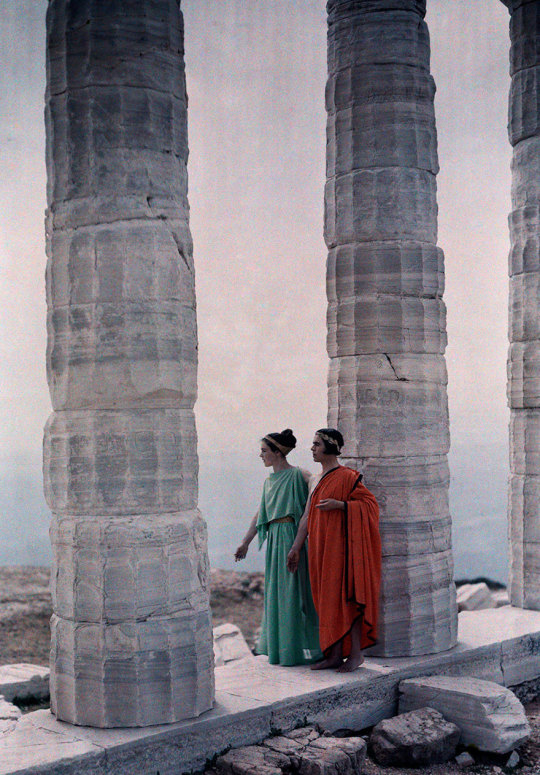
Two Dancers In Costume Stand Between The Columns Of Poseidon’s Temple, Greece, 1930.
From the archives of National Geographic.
#greece#photography#ancient greek temple#ancient greek religion#greek mythology#poseidon#grecian fashion#vintage#national geographic#temple of poseidon#cape sounion#attica#sterea hellas#central greece#mainland#greek culture
413 notes
·
View notes
Text
Okay something I wish people understood more is that folk religion and folklore is never static. It varies by region by year by storyteller. There is no Single True Canon in an oral folk tradition. Ancient Greek Religion for example was not one set thing, there is no one set version of “Greek Mythology” or Hellenic folk traditions that is correct. There are different cults that were worshipped in different regions and whose traditions changed over time, some of which had membership that was often mostly a political thing (i.e. most prominent political figures in Greece and Rome for several centuries were inducted into the Eleusinian mystery cult which worshipped Demeter and Kore) or just based in which cities worshipped which patron gods. Hesiod’s Theogeny, the Homeric Hymns, the Apollodorus, all of which are written records of tales from “Greek Mythology,” contradict each other in various ways. Most Greek and Roman plays and epics were written more in response to contemporary political situations than any adherence to a specific legend.
There is no single set canon to other folk traditions either. The body of Arthurian canon is also contradictory and was written by a variety of people across several cultures often shaped by individual political lenses.
This is Also true of the modern US equivalent of written folk tales: superhero comics canon. Written by dozens and hundreds of different people across decades responding to different sociopolitical circumstances and publishing priorities, inherently contradictory basically the whole way through.
#tagamemnon#folk traditions#dc comics#arthuriana#also marvel but I try not to care about marvel products any more#caitie speaks#ancient greek religion#hellenism#Caitie talks classics
184 notes
·
View notes
Text
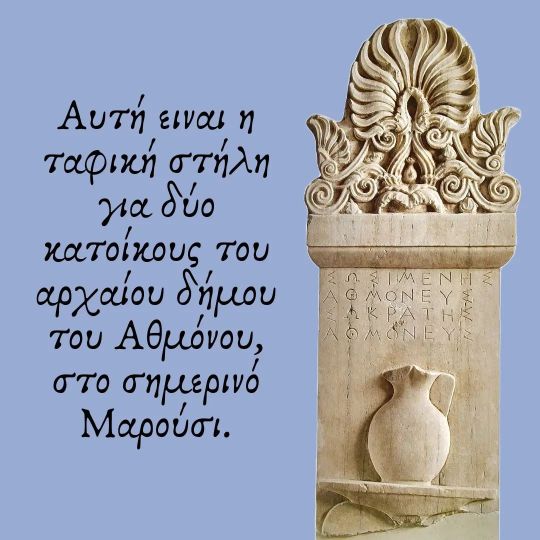
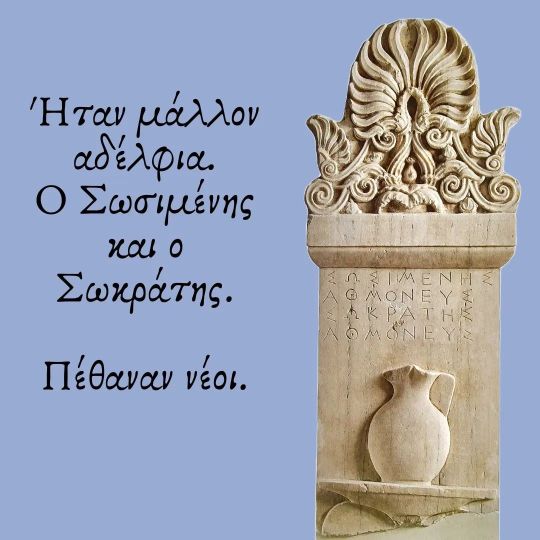
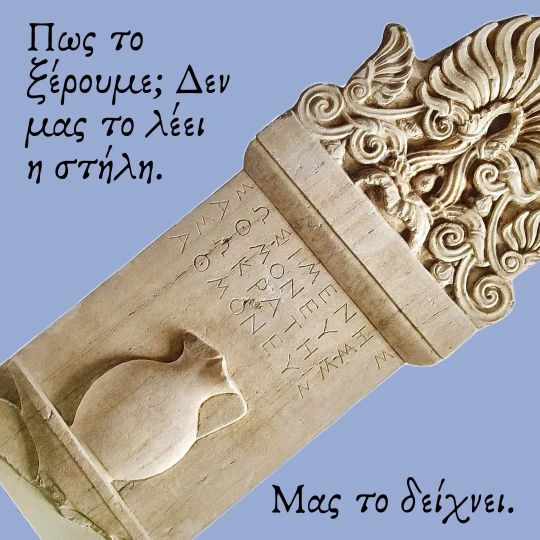
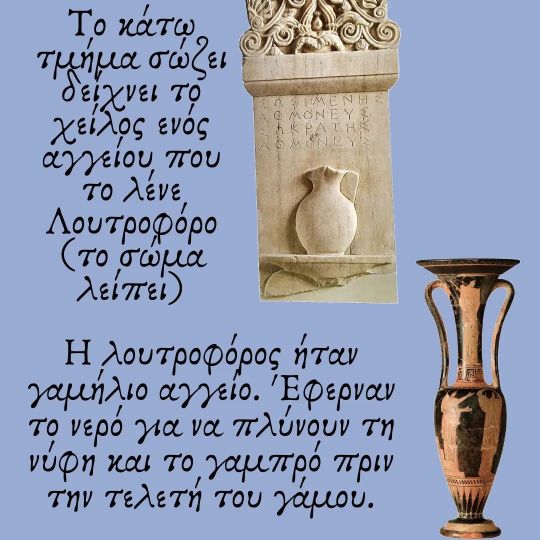
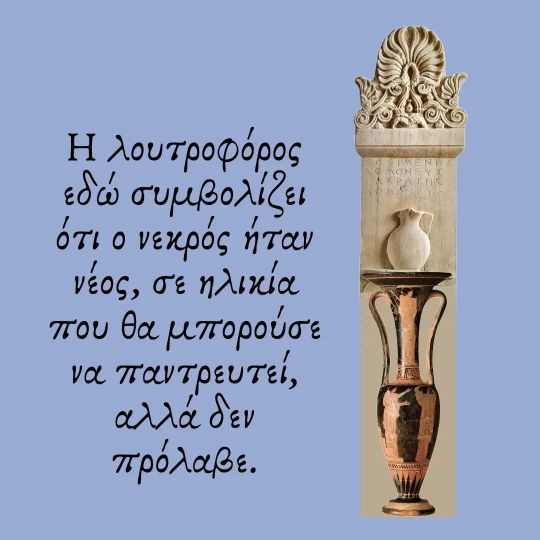
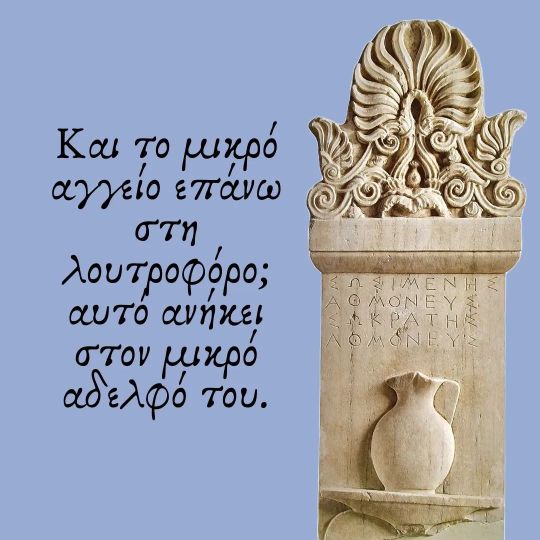
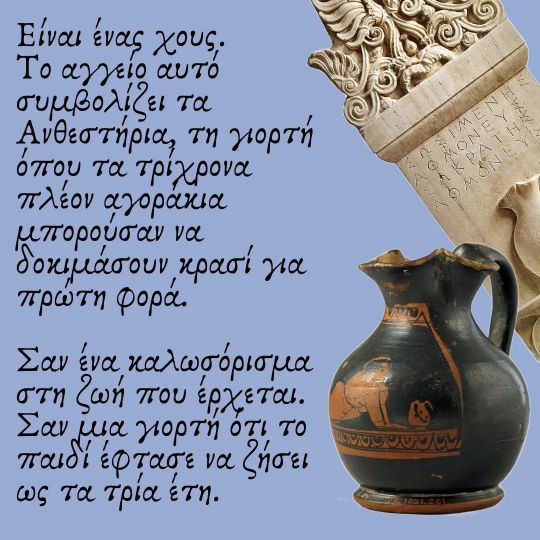
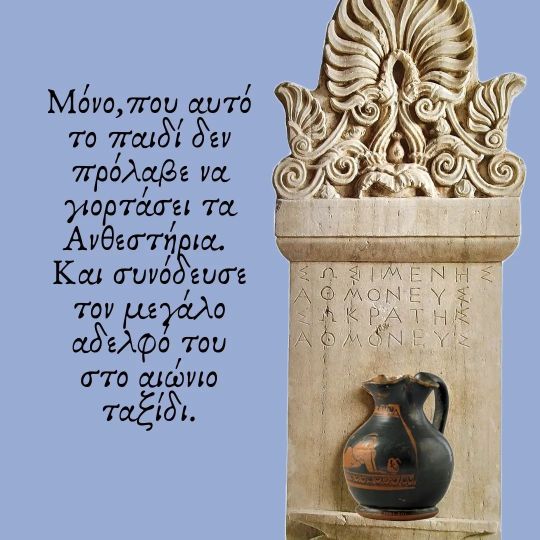
The other day archaeostoryteller made a great post that touched my soul 😢
It was about a funeral stele showing the death of two young brothers, one at a wedding age (Sosmenes) and the other younger than three years old (Sokrates). The loutrophoros (high slim jag) symbolizes the older brother's age since they used it to wash the bride and groom, and the khous (small round pitcher) where they offered wine to three-year-olds in the festival of Anthesteria.
Even today the Greeks bring wedding elements (such as stefana and koufeta) to the funerals of the young and unmarried.
#greece#greek history#ancient stuff#antiquity#ancient greek religion#ancient greek custom#greek custom#greek tradition#hellenismos
81 notes
·
View notes
Text
Time Travel Question: Winner's Match Up 11
These Questions are the winners from the previous iteration.
Please add new suggestions below, if you have them, for future consideration.
44 notes
·
View notes
Text

Patrochilles drawing a year ago
My style was quite different then
#art#achilles#patrochilles#patroclus x achilles#patroclus#the song of achilles#homer's iliad#the iliad#homer#ancient greek religion#ancient greece#greek myth art#Greek mythology#achillean#boy dress as girl#digital art#digital drawing#digital painting
61 notes
·
View notes
Text
“Hey where have you been”
I took magic mushrooms in a meadow filled with daisies and dandelions and met Aphrodite and Zeus and Hera and Hermes and Poseidon and Dionysius and also channeled alligator spirits. And then I converted one of my friends into the cult of Hozier and the cult of Aphrodite. No I will not elaborate further.
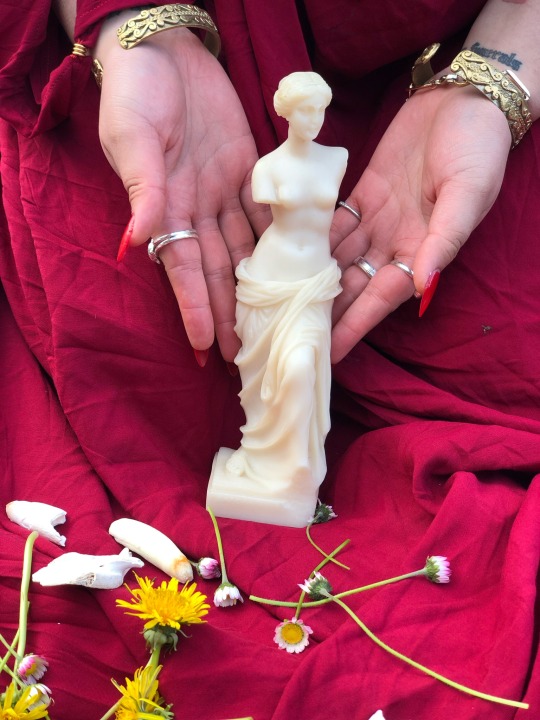
#Hellenic polytheism#hellenic paganism#katalonan#hellenic polytheist#Hellenic pagan#reconstructionist hellenic polytheist#Hellenic polytheist deconstructionist#Ancient Greek religion#that was wild I also called everyone I knew and told them I loved them#Aphrodite#aphrodite devotee#Aphrodite Areia#aphrodite the warlike
50 notes
·
View notes
Text
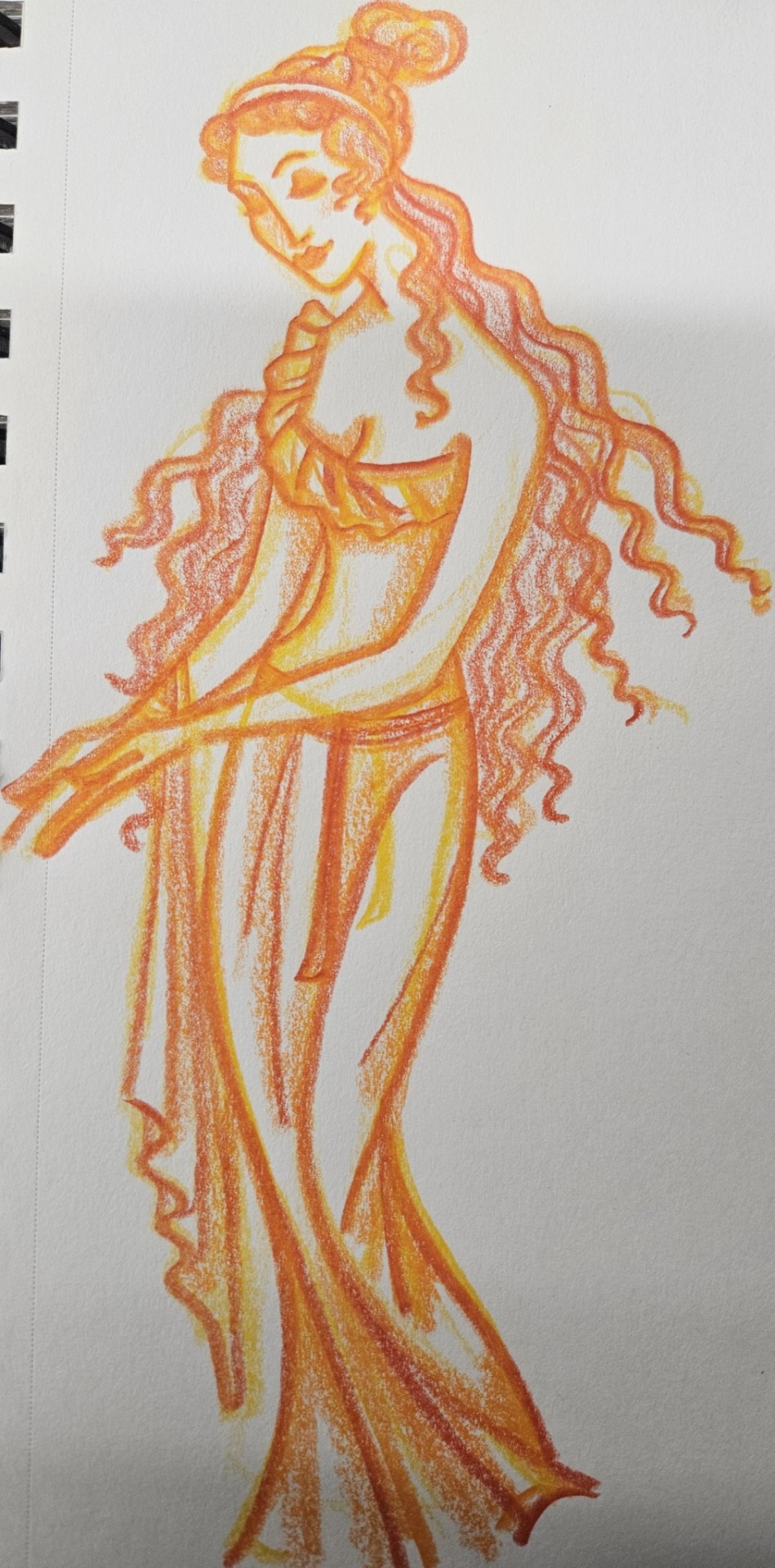

Some Aphrodite studies! One is a copy of an illustration by Janet & Anne Grahame Johnstone; the other, a sculpture. :)
#helpol#hellenic polytheism#hellenic polytheist#hellenic reconstructionism#ancient greek religion#Aphrodite#my art
166 notes
·
View notes
Text
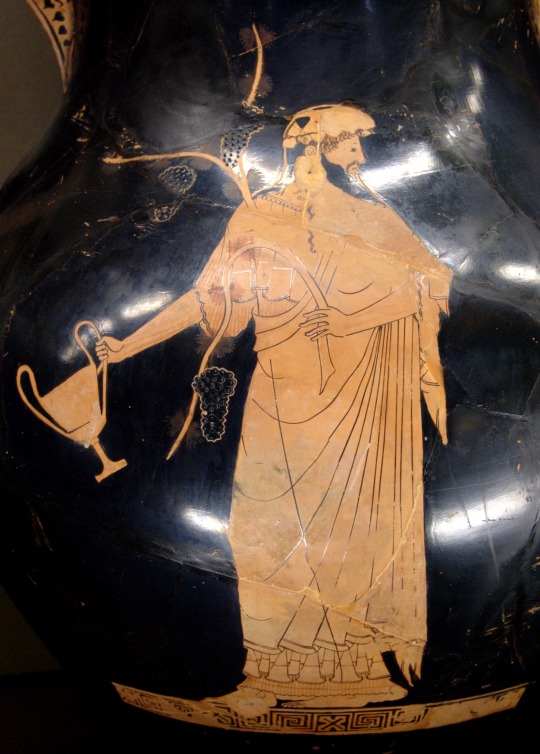
The god Dionysos, holding a kantharos (two-handled drinking cup) in his right hand and a grapevine in his left. Side A of an Attic red-figure amphora attributed to the Berlin Painter and dated between 490 and 480 BCE. Found at Vulci; now in the Louvre.
#classics#tagamemnon#Ancient Greece#Greek religion#Ancient Greek religion#Hellenic polytheism#Dionysus#Dionysos#art#art history#ancient art#Greek art#Ancient Greek art#vase painting#red-figure#amphora#Berlin Painter#Louvre#Louvre Museum#Musee du Louvre
474 notes
·
View notes
Text
locked tomb morning thoughts : something about John being born from Alecto (born on Earth + his powers come from her) and being immortal and somehow controlling time at least a little bit, and, in Greek mythology, Cronos (Titan, son of Gaïa) being associated with Chronos (Titan of time) and eating his children because one of his kids would become more powerful than him and overthrow him…. John told Kiriona she could become his cavalier…. idk. maybe it’s just my brain trying to create more links between my hyperfixation (TLT) and my special interest (ancient greek religion)
#the locked tomb#tlt#tlt meta#tlt series#tlt theories#tlt analysis#alecto tlt#john gaius#kiriona gaia#greek mythology#ancient greek religion
54 notes
·
View notes
Text

When Poseidon pisses Zeus off...
Genesis thunderstorm looming over the Temple of Poseidon, Greece. Photo by @leva_alex on Instagram.
#greece#storm#weather#thunderstorm#poseidon#zeus#greek mythology#ancient greek religion#greek temple#temple of poseidon#cape sounion#attica#central greece#sterea hellas#mainland
2K notes
·
View notes
Text
My (incomplete) folder for Hera and Juno
Leaving it here so I can get the motivation to collect all new things I read in one place instead of forgetting where I've put them and being unable to find them in moments of need. Will add more as soon as I read them.
#I make no claims concerning quality. Just adding the documents I've downloaded and read#some are excellent some not#resources#hera#greek mythology#ancient greek religion#juno#iuno#books#articles#research
16 notes
·
View notes
Text
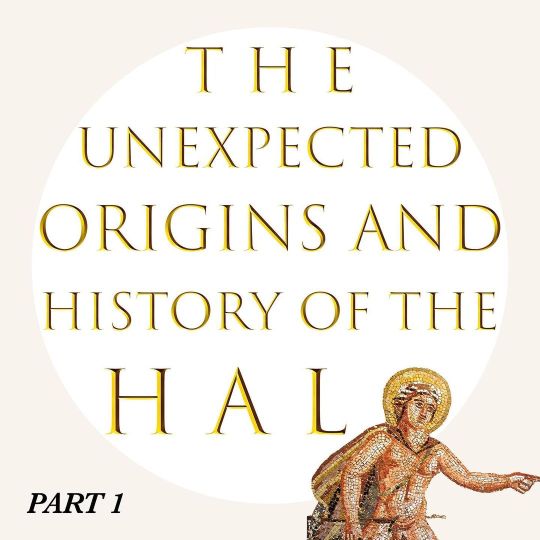
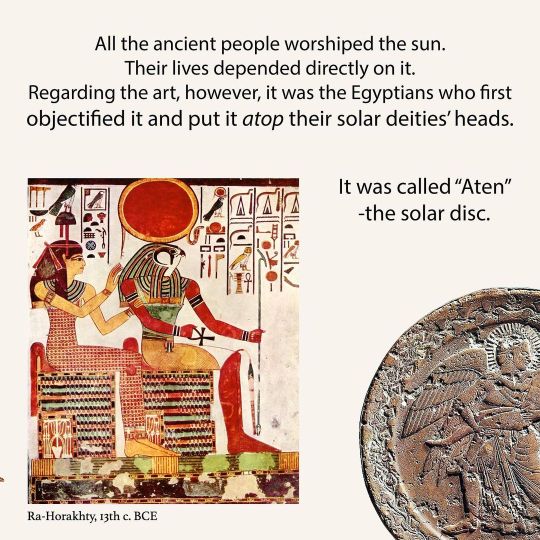





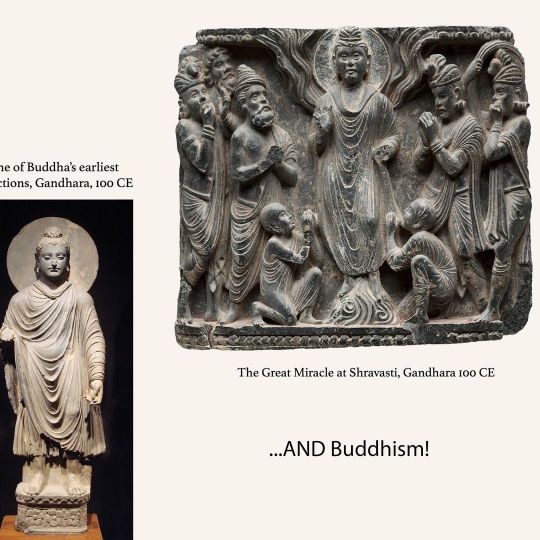
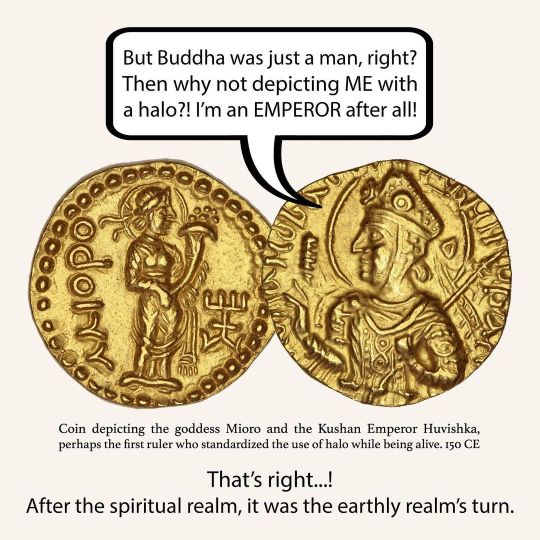

source
#ancient greek religion#btw Greek culture also became Roman culture in the sense that Greeks became Romans too#So when you see “Roman culture” definitely mentally include the Greeks in it#halo#saints#history
46 notes
·
View notes
Note
Do you know of any good resources on ancient Greek festivals? Festivals like Thesmophoria.
So, THE chief book on Greek religion generally remains Walter Burkert’s Greek Religion. If you’re interested in the topic, buy yourself a used copy. (Linking to Harvard UP, but you can probably find a copy out there for $5 or less if you don’t mind highlighting.)
Although published in 1987, and while sections have been superseded by more recent discussions, this is STILL the go-to book as a starting place. It’s just an astonishing, encyclopedic collection of knowledge and Burkert’s students (and their students) still dominate the field of Greek religion.
Let me also add the Oxford Classical Dictionary. Now in it’s 4th ed. (2012), this is another critical book for anyone interested in the ancient world. Check it for the individual entries on gods and festivals. It may not have the most up-to-date information, but it’s solid and, again, comprehensive. The link goes to the online version to which you can subscribe, but there’s a paper version too. It’s been out long enough that a cheaper used copy is available.
As for Demeter and especially Persephone, prominent in the Thesmophoria, Ellie Makin Roberts put out the very important Underworld Gods in Ancient Greek Religion, which was sadly out of price-range for most in hardcover. The paperback is more reasonable. I’ve linked to Routledge’s site, but you can find it cheaper elsewhere. (It’s currently on sale at Amazon as of 2/22/23.) Incidentally, she has another book coming out on the Greek goddesses later this year. It’s not academic in the same way as that listed, but much cheaper, and I expect it to be quite good.
Routledge does have a “Gods and Heroes” series, btw, which I quite like. These little books, written by specialists, are aimed at undergrad audiences and/or interested others. They’re great. BUT they don’t have Demeter or Persephone yet.
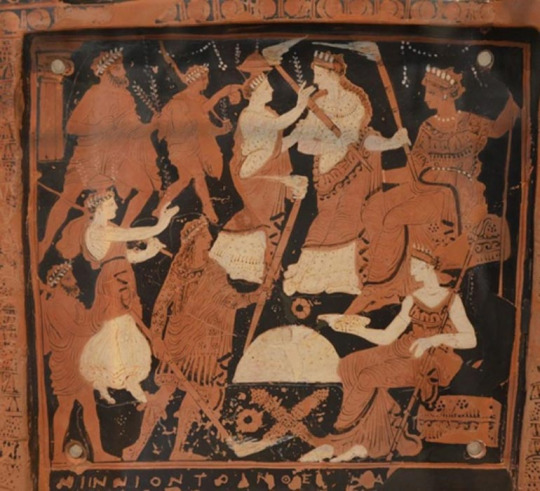
Information on specific festivals is usually best searched (on JSTOR or Google Scholar) by the name of the festival. I did a real quick search and here are three:
Sarah Iles Johnston has an article in History of Religions 52.4 (2013), 370-401: “Demeter, Myths, and the Polyvalence of Festivals.” I’ve not read it, but given who wrote it, I expect it’s an excellent discussion. (I just downloaded the PDF to save for later myself.) You’d need access to JSTOR to read it, or you can probably order a single copy.
Froma Zeitlin wrote “Cultic Models of the Female: Rites of Dionysos and Demeter,” in Arethusa, Vol. 15, No. 1-2 (1982), 129-57. Again, have not read it, but the name alone recommends it, although it may also be somewhat dated now.
Last, Chris Faraone has “Curses, Crime Detection, and Conflict Resolution at the Festival of Demeter Thesmophoros” in The Journal of Hellenic Studies, Vol. 131 (2011), pp. 25-44. Once more, the name alone is a recommendation.
So I’d suggest poking through Google Scholar to find articles. Or, again, if you’re at a uni, use your JSTOR access. Do recall that Aristophanes wrote a comedy called the Thesmophoriazusae,” so a lot of articles may address that rather than the festival. While the play does provide some useful info on the festival, the usual caveats apply when using drama, and especially comedy.
There’s some cool work being done on Persephone in S. Italy too, at Calabria and (Italian) Locris. You might be especially interested in the Persephoneion there: her sanctuary. These are part of the Magna Graecia diaspora.
#asks#Persephone#Demeter#Thesmophoria#bibliography on Greek religion#ancient Greece#ancient Greek religion#ancient Greek festivals#Classics#tagamemnon
104 notes
·
View notes